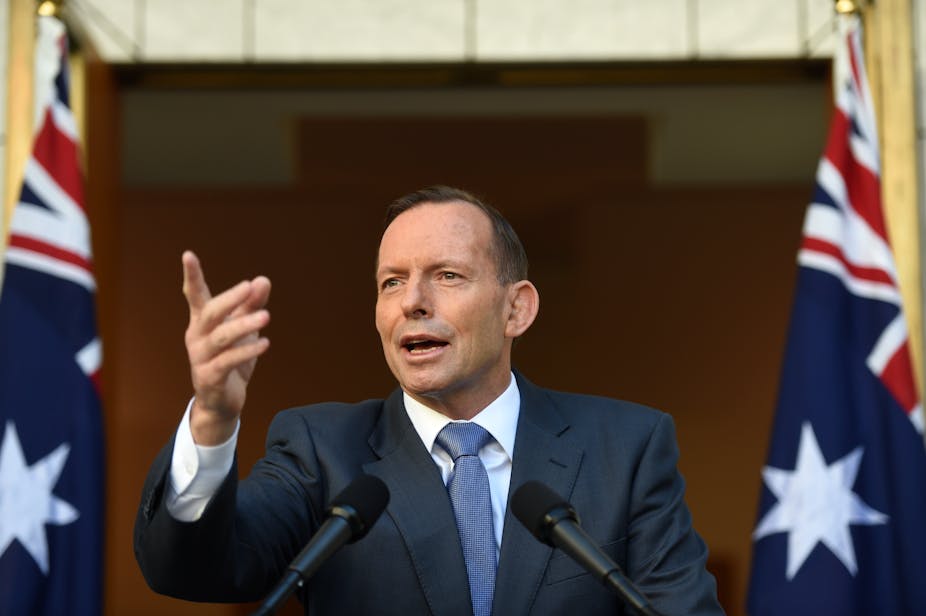After a shocker week in Canberra and a Liberal turf-out in Victoria, Tony Abbott conspicuously changed the tone of his government’s rhetoric.
At his long Monday news conference he no longer behaved like a robotic actor treating his audience as mugs.
But this was neither a mea culpa, nor a change of heart.
He admitted last week had been “ragged”; tried some candour (“I accept that what we are doing with the ABC is at odds with what I said immediately prior to the election”); and sought to argue rather than simply assert positions.
Abbott announced only a modest sop on defence force allowances – failing to mollify ex-Palmer United Party senator Jacqui Lambie, who is voting against all government legislation over the pay issue. There was no other policy revision.
The Abbott on display was a throwback to the persona often seen when he was a minister but increasingly missing since he became leader, five years ago to the day. He seemed, however briefly, to have escaped the straitjacket he’s mostly in.
Of course the performance was a strategy, obviously workshopped beforehand with the minders. Still, it was better than much from him recently, even if the bone thrown to media dogs was gauche (“you’ll want to put your views to me so the floor is yours”).
He juggled defending achievements with (sort of) admitting problems. Last week’s troubles were a matter of atmospherics (well, not really).
Appearances did count, he accepted, but “no-one can accuse us of not trying to crack on with things. No-one can accuse us of not having a distinctive position.” He continued to be optimistic that come the federal election people would acknowledge this.
As for the now infamous “barnacles”, it was “very important that we crack on with the task of budget repair”. The government stood by things that would have a lot of difficulty in the Senate, “but if Plan A is in trouble, obviously you contemplate a potential Plan B”.
“Now when something goes before the Senate you might decide that, rather than having the best, you’ve got to have something which is better but not quite as good as what you wanted. That’s the kind of thing that I was alluding to when I said I would be taking the barnacles off before Christmas,” he said.
As he spoke the government was having little success with that big barnacle, the higher education package, despite substantial concessions offered. Both Coalition and Labor (including Bill Shorten himself) are working key crossbenchers. On Monday night PUP and Lambie were holding firm against – the government can’t win with all these three saying no.
Abbott said people should not assume next year’s budget would see large pruning. Apart from the never-ending search for “sensible savings”, he said, “I think that the fundamental decisions were made in this budget and this gives us the foundation on which we can build.”
Given that some of these and other savings are jammed in the Senate, and revenue is being revised downwards, this prompts the question: where will the mission to “crack on” with budget repair be left by May?
On paid parental leave, the debater turned the point back on his inquisitors who, he noted, invited him to change a policy taken to two elections yet damned the government for broken promises. But he allowed for tweaks when the plan came to the Senate early next year.
Abbott spelled out a balance between promises and flexibility. “The ultimate commitment that all politicians should give to the people and, certainly, the ultimate commitment that this government makes is to do its best to govern as effectively as we can given the circumstances that we find ourselves in and as close as we possibly can in conformity with our commitments.”
On his own measure, the Abbott government has fallen a long way short there.
The lower key, more reasonable tone continued in parliament’s Question Time. Shorten was allowed to table a petition of 60,000 signatures on defence pay. Speaker Bronwyn Bishop had got the message – for once she didn’t throw anyone out.
Labor neatly skewered Abbott on promise breaking, with Tony Burke wanting to know whether he was “seriously asking the Victorian government to break an election commitment the Monday after the election?” This followed Abbott’s plea for Daniel Andrews to sign up for the East West Link project.
Given the circumstances, Abbott’s political strategy to engage rather than put up the shutters was a sound one. But one day does not a political revival make.
He will find it hard to break ingrained habits.
A change of tone should also be accompanied by fresh government thinking in some policy areas – in particular on the issue of “fairness” – not just a few forced backtracks.
And Abbott needs to widen his circle of advice. Asked about his office’s flawed briefing of journalists last week on the Medicare co-payment, and criticism of his chief of staff, Peta Credlin, he strongly defended the office, which is perennially under fire within Coalition ranks.
“My office is essentially the same office that got us from nowhere to election parity in 2010 and gave us a very strong victory in 2013,” he said. This was “loyal Tony”, harking back to the road up.
Running a government, however, requires different skills – a broader inclusive approach.
Remembering the lessons of the Rudd era that saw a prime minister too inwardly focused, Abbott should look more to his senior ministerial colleagues.

